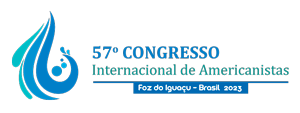| Dados do autor | |
|---|---|
| Nome | Elizabeth Leclerc |
| E-mail do autor | Email escondido; Javascript é necessário. |
| Sua instituição | University of Maine UMO |
| Sua titulação | Master's Degree student |
| País de origem do autor | Estados Unidos |
| Dados co-autor(es) [Máximo de 2 co-autores] | |
| Email escondido; Javascript é necessário. | |
| Nome completo | Daniel Sandweiss |
| Titulação | Doctor |
| País de origem do co-autor | Estados Unidos |
| Instituição | University of Maine UMO |
| Nome completo | Shaleen Jain |
| Email escondido; Javascript é necessário. | |
| Titulação | Doctor |
| Instituição | University of Maine UMO |
| País de origem do co-autor | Estados Unidos |
| Proposta de Paper | |
| Área Temática | 01. Antropologia |
| Grupo Temático | El manejo del agua en los Andes : pasado, presente y futuro |
| Título | Re-viewing Andean water histories: incorporating socio-hydrology into the archaeology of coastal water management |
| Resumo | As a science conceived and developed in humid-temperate regions and one that idealizes “pristine” systems without human interference, hydrology has been of limited help in understanding the intertwined social and hydrological histories of the coastal Andes. Socio-hydrology is a recent transdisciplinary approach that merges the geo- and social sciences to understand the dynamics of co-evolved social-hydrological systems. Integrating this framework with archaeological research can provide a deep-time perspective on coupled human and water systems in the coastal Andes and insight into their complex feedbacks. Such research is essential for predicting future system dynamics in the present period of rapid climate change, and for developing effective water management systems and achieving sustainable water futures for the region. Here, we explore what socio-hydrology can offer coastal Andean archaeology as well as future water management. We examine the archaeology of water management in the coastal Andes from a socio-hydrological perspective, teasing out the dynamics of water flows in a re-imagining of the Andean “water cycle.” We then outline how socio-hydrological frameworks can be applied to research problems in coastal Andean archaeology, with examples from the Supe Valley. For instance, if we redefine intra- and inter-valley trade of agricultural products as the trade of “virtual water”, how does this alter our understanding of agricultural intensification in the Late Preceramic Period? How did societies modify and then respond to changes in surface runoff and concomitant changes in the landscape? How have these past dynamics influenced the character of modern water management and use? Our goal is to illustrate this approach’s potential to complement traditional archaeological approaches, suggest its role in reimagining human-water relationships into the future, and stimulate ideas and collaborations to this end. |
| Palavras-chave | |
| Palavras-chave |
|
